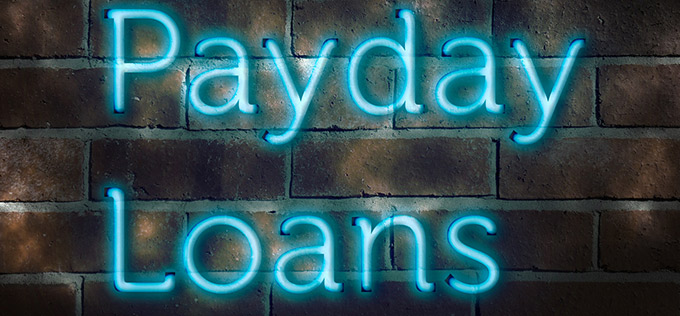
Thinking of a Payday Loan? Don’t! If you’re a regular reader of this blog, and I sincerely hope you are, you’ll know I’ve talked often about avoiding high-interest rates at all costs, be it when considering a new credit card, a personal loan or a mortgage, and taking steps to ensure you get the best interest rate possible. That being said, you can understand why nearly 400 percent interest is simply outrageous and something you never want to see when you’re considering taking out a line of credit.
This level of sky-high interest is routinely tied to what’s known as payday loans, and I wouldn’t be exaggerating when I say they should be avoided like the plague. These loans are usually taken out in desperate situations, when people are facing emergencies and only need a small amount of money to tide them over. The problem, in addition to the astronomical interest rate, is – these types of loans usually have a small window of time in which you have to repay – usually two weeks, a month or until your next paycheck – until the loans are rolled over and renewed. Once this happens, many people find themselves mired in a crippling cycle of ever-growing revolving high-interest debt which quickly compounds and spirals out of control.
Now, do you need any additional motivation to steer clear? I didn’t think so. With that done, let’s talk about different routes you can take when you are in need of emergency funds rather than falling victim to what is really nothing more than a financial scam.
However, before I launch into a list of payday loan alternatives, let me stress that resorting to borrowing money in an emergency situation is never the best option and should be viewed as a last resort. To ensure you have funds when you need them, resolve now to start building an emergency stash of cash, typically $1,000, preferably more. It’s the new year right? So what better resolution than to ensure you’re well equipped to financially manage whatever curveballs are thrown your way.
That being said, let’s discuss borrowing alternatives to the dreaded payday loans.
- Personal loans. Banks, credit unions or any other reputable financial institutions which can offer you an unsecured installment loan are one way to go. These types of loans usually come with a minimum 90-day repayment option, no unreasonable collateral requirements, loan renewal limits and late payment forgiveness, at least once. These loans likely also take into consideration your ability to repay, offering you flexibility should problems arise.
- Employer pay advances. If quick cash is what you need, consider calling on the one that supplies your paycheck. Explain your situation to your boss or your human resources department and inquire about the possibility of having your paycheck in hand a little sooner than usual. You might be surprised what a bit of honest negotiation might net you. Also, a payday advance usually means no interest, so it’s a good deal if you can swing it.
- Creditor payment plans. Another time to consider negotiation is if your need for money involves pressing payments on existing debt. Calling creditors and explaining the situation, with an emphasis on your desire to pay but temporary inability to do so, usually goes a long way. After all, creditors want to get paid. So if they understand you are more able to pay if they offer you temporary flexibility in terms of a skipped payment or two or a decrease in your minimum payment to a level you can afford, then they are more likely to concede to that situation rather than have you miss several payments in a row and be forced to turn your account over to collections.
- Emergency assistance. When faced with money challenges, people can often turn to their faith communities for help or to non-profit community organizations. Many of these groups provide money for utility bills, groceries or vehicle payments. A quick internet search can yield surprising results of which you may have been unaware.
- Selling valuables. I promised alternate solutions when it comes to avoiding payday loans even if it means urging you to consider solutions you would rather avoid. So, if you have items you can unload on social-media selling sites, at pawn shops or even through a garage sale, make it happen. Also regarding pawn shops, some might be willing to offer you collateral on your prized possessions rather than buying it outright. This is a way to secure funds without selling off your prized possessions. However, finance charges will likely apply so make sure you have all the details before you make the transaction.
- Borrow from friends or family. Speaking of options you’d rather avoid but may have no choice, you may be forced to ask a loved one to lend you the needed cash. However, if at all possible, offer to pay a small interest fee and set up a doable, but definite, timetable for repayment if for no other reason than to not risk damaging the relationship.
- Pull money from retirement accounts. Some employers may allow you to withdraw some of your money from your 401(K) or individual retirement account (IRA). There are some benefits to this, as you are allowed to borrow from your IRA once a year without penalties as long as the money is repaid within 60 days. After that, taxes will be applied in addition to a 10 percent penalty if you are younger than 59.5 years old. As for your 401(K), you may be able to borrow half of your balance, up to $50,000, and take advantage of five years to pay it back. Check with your employer for the details.

- Credit counseling. Granted, this isn’t an immediate solution but it may help you avoid finding
yourself in a situation where you’re desperate for money once again. This service will focus on not growing your debt and helping you to create a long-term repayment plan. However, be sure to research credit counseling and consider the pros and cons before taking that route.
Finding yourself in a situation where a payday loan seems like your only option is not somewhere you want to be financially. At American Credit Foundation we urge you to consider any alternative to going that route. If you need further assistance in addition to what’s provided here, please contact the team at American Credit Foundation.